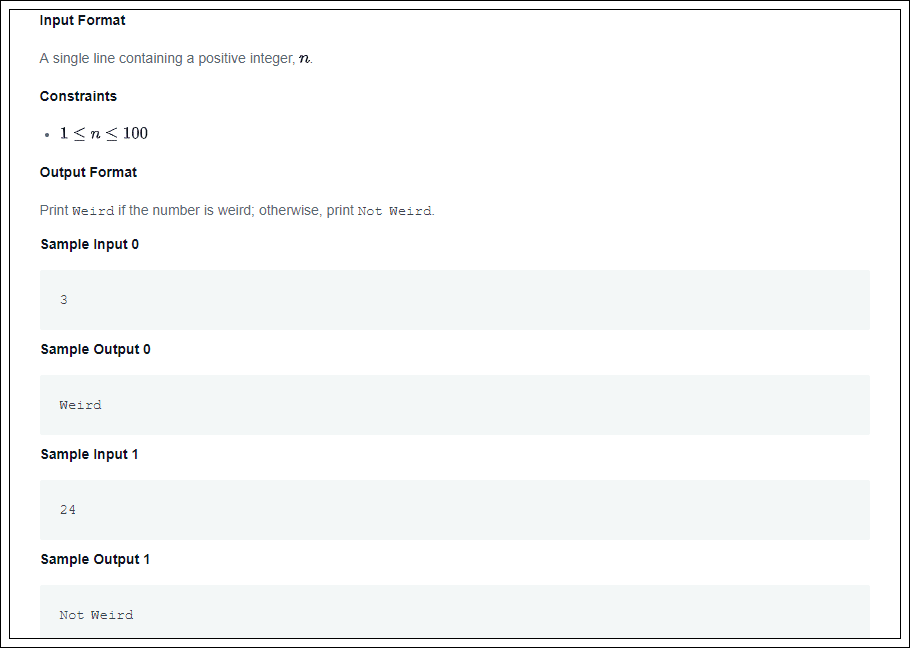Hackerrank Day 3 Intro to Conditional Statements Solution in C, C++, and Java programming language. In this programming problem, we are going to learn about the If-Else statements, We have to use Even-Odd logic, and Greater and Less Number logic to solve this Programming Problem of the Hackerrank Website.
Problem Statement:- According to Hackerrank, you should follow these four given conditions. Hackerrank Intro to Conditional Statements Solution in C.
- If ‘n’ is odd, print Weird.
- If ‘n’ is even and in the inclusive range of 2 to 5, print Not Weird.
- ‘n’ is even and in the inclusive range of 6 to 20, print Weird.
- If ‘n’ is even and greater than 20, print Not Weird.

Intro to Conditional Statements Solution Explained
Let’s start, so we have a number n and we need to write a program that follows the above four conditions as we can see that our first condition is if n is odd the program will print the number “Weird“.
So for this first condition, we divide a number by 2 if a number is divisible by 2 then the number is even and if the number is not divisible by 2 then it will print the number as “Weird‘.
Now come to the second condition if the number is even and ranges from 2 to 5 the program will print the number “Not Weird“, for that again each number we divide by 2 if the number is even and the number is between the range(of 2 to 5) the program will print Number is “Not Weird”.
Again comes the third condition if the number is between 6 to 20 then the program will print the number as “Weird“. same as the second condition. Again check for the fourth condition if the number is greater than 20 then the program will print the number as “Weird“.
Day 3 Intro to Conditional Statements Solution In C
#include <assert.h>
#include <limits.h>
#include <math.h>
#include <stdbool.h>
#include <stddef.h>
#include <stdint.h>
#include <stdio.h>
#include <stdlib.h>
#include <string.h>
char* readline();
int main()
{
char* N_endptr;
char* N_str = readline();
int N = strtol(N_str, &N_endptr, 10);
// Complete the solve function below.
if(N%2==0)
{
if(N>=2 && N<=5)
{
printf("Not Weird");
}
else if(N>=6 && N<=20)
{
printf("Weird");
}
else
{
printf("Not Weird");
}
}
else
{
printf("Weird");
}
if (N_endptr == N_str || *N_endptr != '\0') { exit(EXIT_FAILURE); }
return 0;
}
char* readline() {
size_t alloc_length = 1024;
size_t data_length = 0;
char* data = malloc(alloc_length);
while (true) {
char* cursor = data + data_length;
char* line = fgets(cursor, alloc_length - data_length, stdin);
if (!line) { break; }
data_length += strlen(cursor);
if (data_length < alloc_length - 1 || data[data_length - 1] == '\n') { break; }
size_t new_length = alloc_length << 1;
data = realloc(data, new_length);
if (!data) { break; }
alloc_length = new_length;
}
if (data[data_length - 1] == '\n') {
data[data_length - 1] = '\0';
}
data = realloc(data, data_length);
return data;
}Day 3 Solution in C++ Language
#include <bits/stdc++.h>
using namespace std;
int main()
{
int N;
cin >> N;
cin.ignore(numeric_limits<streamsize>::max(), '\n');
// Complete the solve function below.
if(N%2==0)
{
if(N>=2 && N<=5)
{
cout<<"Not Weird";
}
else if(N>=6 && N<=20)
{
cout<<"Weird";
}
else
{
cout<<"Not Weird";
}
}
else
cout<<"Weird";
return 0;
}Day 3 Hackerrank Solution in Java
import java.io.*;
import java.math.*;
import java.security.*;
import java.text.*;
import java.util.*;
import java.util.concurrent.*;
import java.util.regex.*;
public class Solution {
private static final Scanner scanner = new Scanner(System.in);
public static void main(String[] args) {
int N = scanner.nextInt();
scanner.skip("(\r\n|[\n\r\u2028\u2029\u0085])?");
if(N%2==0)
{
if(N>=2 && N<=5)
System.out.print("Not Weird");
else if(N>=6 && N<=20)
System.out.print("Weird");
else
System.out.print("Not Weird");
}
else
System.out.print("Weird");
scanner.close();
}
}Solution Output

More on “30 Days of Code“
- Class vs. Instance
- Loops
- Let’s Review
- Arrays
- Dictionaries and Maps

